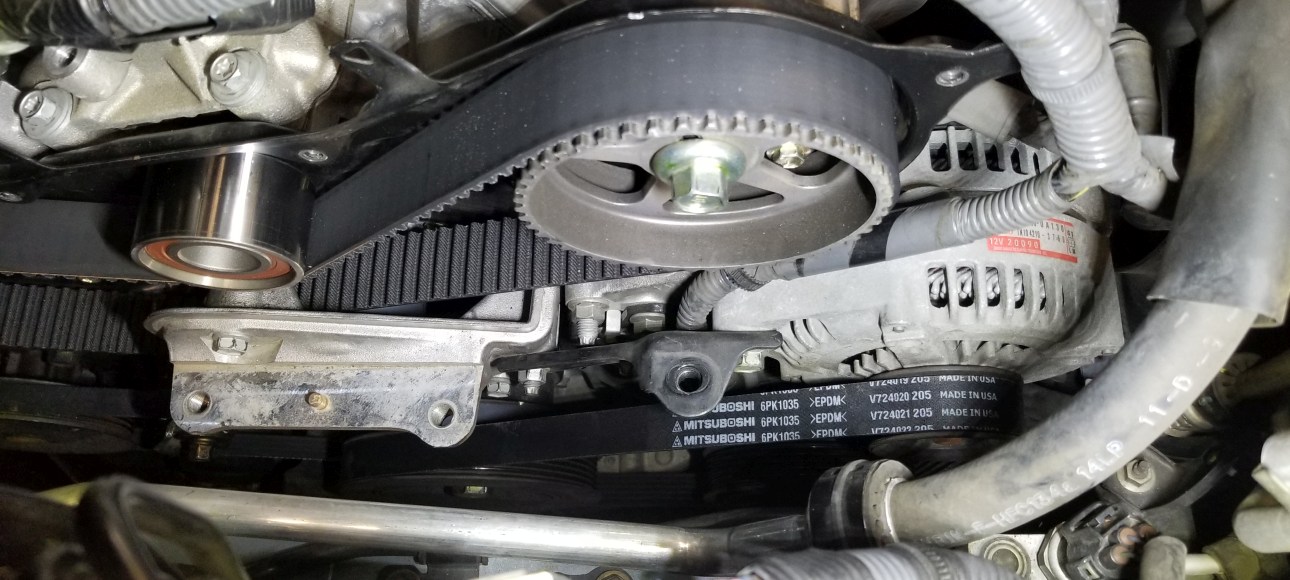What is a timing belt? Simply put it’s a cogged rubber belt that connects the camshaft and crankshaft of an engine. The crankshaft is spun by the pistons via connecting rods, sort of like the crank on a bicycle is spun by your legs and feet. The camshaft must open valves at certain points in the pistons’ travel, so the camshafts’ rotation must be synchronized to the crankshaft’s rotation. This is why the timing belt has cogs. The bumps in the timing belt fit into cogs in the cam and crank sprockets to prevent slippage.
Do all cars have timing belts?
No. Some cars have a timing chain that connects the cam and crank sprockets, and a few cars have a series of gears that connect the cam and crank directly. From the mid-1980s to the mid-2000s, most cars had timing belts. Starting around 2010, most cars were designed with timing chains. The chain trend has continued until today (2021)
If you change your oil frequently, the timing chain should last for the life of the vehicle.
When should I replace my timing belt?
The manufacturer usually publishes a mileage / time interval for timing belt replacement, but it is not always clear or logical or necessarily the best time to replace the timing belt.
Some examples:
Not clear: When the Acura Legend was introduced there was no mileage or time interval published. (Later Acura recommended a 90K mi. 7.5-year interval)
Not logical: Some Mazda cars have a 105K mile interval for federal cars, but a 60K interval for California cars, even though the engine design and the timing belt part number are the same.
Not the best time: Most pre-1998 Toyota cars have a 60K mi. interval, yet the timing belts will easily last until 80K.
So, when should you replace your belt? When in doubt, use the published interval (if there is one). If you want to get the most you can out of your belt, e-mail us with the year and model of your Acura, Honda, Mazda, Nissan, or Toyota, and we’ll be happy to give you our opinion on how far you can push it.
Should I replace the water pump with the timing belt?
Maybe. If the timing belt drives the water pump on your make/model, then yes. It will save you money in the long run. If you are only keeping the car for a short time, well, that’s a different story. If the water pump is blocked by the timing belt (in other words — you must remove the it to remove the water pump), then yes. It will save you money in the long run. If the water pump can be replaced without removing the timing belt, then no, unless the water pump is leaking or worn and is easier to replace while the timing belt is off. But this is only our opinion. You are welcome to do your own research and make your own choice. Just don’t hold us responsible if it doesn’t work out for you.
Should I replace the cam seal / crank seal / oil pump seal / oil pump O-ring?
If they are leaking, then yes. They are much easier / cheaper when done with a timing belt.
If they are not leaking, then it’s up to you. We’re going to recommend it, since there is no downside for us to do so. If we recommend the seals and you choose not to do them and they start to leak and you need to do the whole job over again, then we’re off the hook.
Should I replace the timing belt tensioner / idler?
If they are bad, then yes. On most cars there is no additional labor charge to replace the tensioner or idler when done with the timing belt, so even if they are not bad, it makes sense to consider replace them as part of a timing belt job, provided they are reasonably priced. On some Mazdas they can add $400 to the bill! But on most cars, it adds $50 – $150. Like the seals, there is no downside for us to recommend them, so we’re going to recommend them.
Should I replace the accessory drive belts?
If they are less than perfect, then yes. If they are OK, then they can be replaced anytime without after the job is done. However, there is no labor charge to replace them with the timing belt since we need to take them off anyway.
Does it make a difference what brand of part I use?
Yes. We strongly urge using Original Equipment parts. Sometimes you can get OE parts from sources other than the dealer. For instance, ASCO/Aisin makes water pumps for Toyota. You can buy ASCO/Aisin water pumps from vendors such as WorldPAC for less than the dealer charges for the same parts. Where possible, we do this, and pass savings on to you. When it’s not possible, we recommend biting the bullet and buying OE. It’s more expensive short term but will save you money in the long run.
